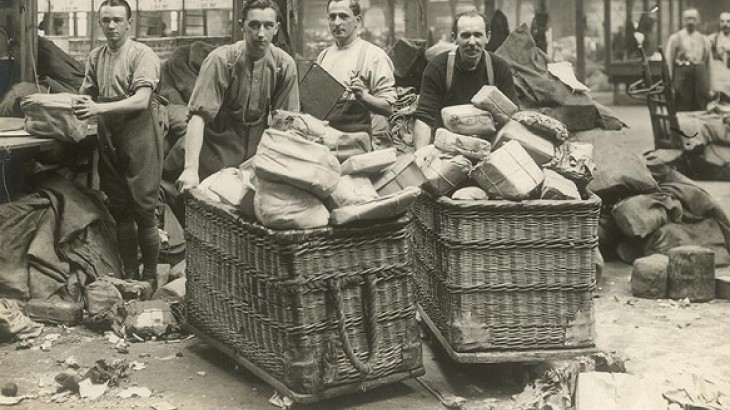Five letters

After four years of bloody conflict, the Armistice, that ended the First World War, was finally signed in November 1918.
A series of letters, the most reliable form of communication in an age when electronic methods were in their infancy, marked the path towards peace.
The formal negotiations began on 8 November 1918 in a luxurious railway carriage in a siding in a forest near Paris. The German delegation, led by civilian Matthias Erzberger, had no choice but to accept tough terms demanded by Britain, France and America.
Rear Admiral Sir George Hope, a member of the British delegation, wrote to his wife Arabella. ‘Erzberger was very nervous at first and spoke with some difficulty, the general awfully sad, the diplomat very much on the alert, and the naval officer sullen and morose.
‘The terms were then read out to them and evidently made them squirm, but they were probably prepared for most of them as they must know the present military position and the state of mutiny in the fleet.’
Rear Admiral Hope's private letter was first published in 1979 by Leeds University historian Peter Liddle, in his book Testimony of War. ‘He was perfectly placed, superbly placed. Nobody better to record it," Dr Liddle told the BBC. ‘It's not just one man's experience, in minuscule, of events, it is a man near the very heart of important things that were happening.’
It is one of five letters, written by key players at key points in the weeks before the Armistice, selected by Cambridge historian Sir Richard J Evans and Royal Mail, to highlight the crucial role of written communication and postal services in the Great War.
‘Every combatant nation had a postal service,’ said Prof Evans. ‘In Britain these were post office personnel who were given military ranks and a bit of training, but basically organised a worldwide postal service across the empire.
‘And you had something similar with the Germans and the Austrians and so on, because it was very important to get letters to the troops and letters back, to maintain morale, and of course at a very high level to communicate.’
After the United States joined the war in 1917, Germany became increasingly isolated as allies such as Bulgaria dropped out. In a telegram on 1 October, Germany's State Secretary for Foreign Affairs, Paul von Hintze, wrote to Army Grand Headquarters: ‘According to the most recent reports from Bulgaria, we must give up the game there. From a political point of view, there is no point in our keeping our troops there, let alone reinforcing them.’ Within days, the Germans requested a truce.
Prince Max von Baden, Imperial Chancellor in a newly formed, more democratic German government, wrote to US President Woodrow Wilson, offering to accept his terms. ‘In order to avoid further bloodshed the German government requests to bring about the immediate conclusion of a general armistice on land, on water, and in the air,’ he wrote.
According to Prof Evans, the German generals ‘thought they were under no illusion about the fact that they were not going to win by this stage and so they thought it was best to sue for peace’.
On 27 October, Germany was further weakened when Austro-Hungary left the war. In a letter to Germany's Kaiser Wilhelm II, Austro-Hungarian Emperor Karl, wrote: ‘It is my duty, heavily though it lies upon me, to inform you that my people are neither able, nor willing, to continue the war.’ This allowed the British and French to push President Wilson for harsher terms, which the Germans simply had to accept.
The fifth letter shows how news of the Armistice was slow to spread to the more distant parts of the war. In east Africa, the British wanted to send a telegram to the German Colonel Paul von Lettow-Vorbeck. But they couldn’t find him, and he only got to hear about the Armistice when his troops captured a motorcycle despatch rider, carrying the telegram.
‘The problem was... he couldn't believe the Kaiser had abdicated, and got in touch with the British High Commissioner asking for confirmation,’ said Prof Evans. ‘Eventually he was given credible evidence that this was not a ruse designed to trick him into abandoning the struggle and signed a formal cessation of hostilities on 25 November 1918.
‘So that's the last gasp of the war really... and it's the GPO (General Post Office) that plays a role in bringing it about.’



